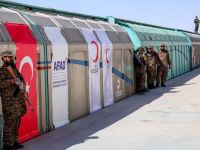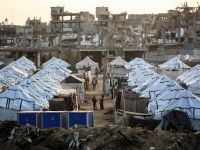Iraq said Thursday it had not yet formulated a response to the UN Security Council's renewal of the new six-month phase of the oil-for-food program in the sanctions-hit country.
"The Iraqi leadership is still studying the issue and a position will be reached later," Oil Minister Amer Rashid told journalists.
The INA new agency said Wednesday a joint meeting of the Command Council of the Revolution and the ruling Baath party executive "studied the UN Security Council position on Iraq following the decision on Tuesday to extend the program".
Rashid said Iraq's position "was not tied to the pricing formula" of Iraqi crude, exports of which were halted on December 1 after the United Nations and Baghdad failed to see eye-to-eye on a pricing mechanism for December deliveries.
"Some progress has been made but differences (over oil prices) remain. We will reach an agreement through dialogue," Rashid said. "We hope an agreement will come without pressure from the United States."
Exports of Iraqi crude were suspended over the pricing formula for exports and a premium which Iraq wants paid outside the UN escrow account for its oil revenues.
The move has taken between 2.3 and 2.4 million barrels per day of Iraqi crude off the world market.
An Iraqi newspaper, meanwhile, slammed the UN Security Council's decision to extend the program under which Baghdad exports crude, saying it was not a substitute for a lifting of sanctions.
"This program was supposed to be temporary to give the United Nations a delay of six months to examine the lifting of the embargo on Iraq, but now we have the extension for a 9th phase," said Ath-Thawra, mouthpiece of the ruling Baath party.
"By insisting on not lifting the embargo, the UN Security Council contradicts itself and violates international law and the UN charter.
"That has happened because the council is no longer an international authority but an American body that defies every law by perpetuating the sufferings of a peaceful people," it said.
The paper charged that the embargo was upheld by the US administration to "weaken Iraq, pillage its riches, starve its people and stop its development by stopping it from controlling its resources".
Since the launch of the program in December 1996, Iraq had only received "foods, medicines and essential goods worth 8.5 billion dollars while it had exported crude worth 38 billion dollars", it said.
"The US and British representatives on the UN sanctions committee play a treacherous role in prolonging the attacks undertaken in 1991 (in the Gulf War) by US and British planes," the paper continued – BAGHDAD (AFP)
© 2000 Al Bawaba (www.albawaba.com)







